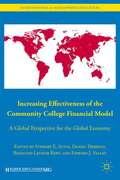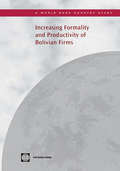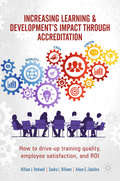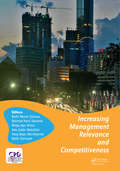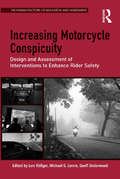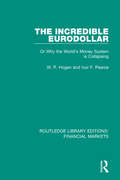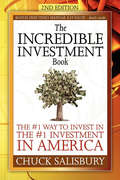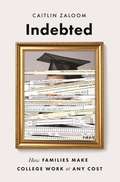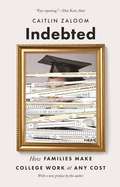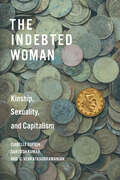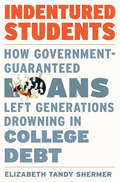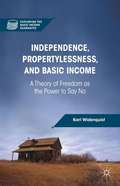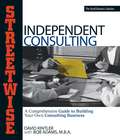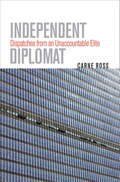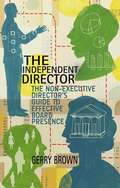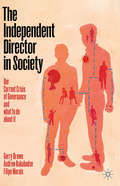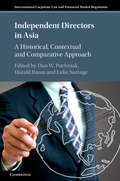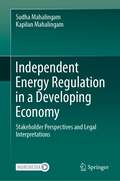- Table View
- List View
Increasing Effectiveness of The Community College Financial Model
by Stewart E. Sutin Daniel Derrico Rosalind Latiner Raby Edward J. ValeauThisbook seeks to explore thematic and pragmatic applications of financing the community college to help facilitate educational reform, to assist efforts related to internationalization, and to create systemic support systems to maintain the mission.
Increasing Formality and Productivity of Bolivian Firms
by The World BankBolivia's informal economic sector is the largest in Latin America and has been attributed to many factors including the burden of regulations, the weakness of public institutions, and the lack of perceived benefits to formality. 'Increasing Formality and Productivity of Bolivian Firms' presents fresh qualitative and quantitative analyses to help understand the reasons why firms are informal and the impact of formalization on their profitability, in order to better inform appropriate policies. A crucial finding of the study is that the impact of tax registration on profitability depends on firm size and the ability to issue tax receipts. The smallest and largest firms have lower profits as a result of tax registration because their cost of formalizing exceeds benefits. The study concludes by recommending policy priorities to increase the benefits of formalization through information, training, access to credit and markets, and business support. Longer-term policy recommendations include simplifying formalization, regulatory, and taxation procedures and reducing their costs, as well as measures to boost the productivity of small and micro firms.
Increasing Gender Diversity in the Boardroom: The United Kingdom in 2011 (A)
by Jenny Sanford Iris Bohnet John BeshearsIncreasing Gender Diversity in the Boardroom: The United Kingdom in 2011 (A) by John Beshears, Iris Bohnet and Jenny Sanford
Increasing Gender Diversity in the Boardroom: The United Kingdom in 2011 (B)
by Jenny Sanford Iris Bohnet John BeshearsSupplement
Increasing Gender Diversity in the Boardroom: The United Kingdom in 2011 (B)
by Iris Bohnet Jenny Sanford John BeshearsSupplement
Increasing Learning & Development's Impact through Accreditation: How to drive-up training quality, employee satisfaction, and ROI
by William J. Rothwell Sandra L. Williams Aileen G. ZaballeroThis book provides a guide to the process of accrediting training programs, sets out how to achieve consistent measurement of the results of training, and explains why accreditation is critical for capturing and developing today’s workers’ skills, aiding retention, and boosting strategic organizational credibility with millennials. Workplace and executive training is a multi-billion dollar industry and yet an enormous percentage of that budget is spent on programs that have never been rigorously examined to ensure that they are fit for purpose and deliver value for the money. If you’re signing off on that budget, or asking your people to spend time on training programs, shouldn’t that concern you? Training accreditation offers vital quality assurance, ensures global consistency of results and delivers accountability for learning and performance outcomes. Apart from delivering better results and greater ROI, organizations can differentiate themselves from their competitors in the employment marketplace by offering accredited proprietary training. After all, digital natives, and indeed all of today’s most talented potential employees, expect (and increasingly demand) the high quality, engaging and transferable employee development that only accredited programs can deliver. Aligning with the standards set by the International Association of Continuing Education and Training (IACET) – today’s premier accreditation body for training programs – the authors offer principles for quality program structure, delivery, and improvement needed to achieve accreditation. They share practices used by high quality training program managers today, covering business alignment and program administration along with the planning, design, delivery and evaluation of learning systems.
Increasing Management Relevance and Competitiveness: Proceedings of the 2nd Global Conference on Business, Management and Entrepreneurship (GC-BME 2017), August 9, 2017, Universitas Airlangga, Surabaya, Indonesia
by Badri Munir Sukoco Rahmat Heru Setianto Nidya Ayu Arina Ade Gafar Abdullah Asep Bayu Nandiyanto Ratih HurriyatiIncreasing Management Relevance and Competitiveness contains the papers presented at the Global Conference on Business, Management and Entrepreneurship (the 2nd GC-BME 2017), Surabaya, Indonesia on the 9th of August, 2017. The book covers 7 topics: 1. Organizational Behavior, Leadership, and Human Resources Management2. Innovation, Operations and Supply Chain Management3. Marketing Management4. Financial Management and Accounting5. Strategic Management, Entrepreneurship, and Contemporary Issues6. Green Business7. Management and Economics Education.
Increasing Motorcycle Conspicuity: Design and Assessment of Interventions to Enhance Rider Safety (Human Factors, Simulation and Performance Assessment)
by Lars Rößger Michael G. LennéIt’s a widely recognised trend that powered-two-wheelers' (PTWs) use has been steadily increasing and is projected to increase further. While providing benefits to the community in the form of reduced traffic congestion and environmental benefits, the risks to PTW riders remain and visibility will always be a key issue. Increasing Motorcycle Conspicuity aims to illustrate how driving simulation, field studies and laboratory experiments can be used to improve rider safety through the design and evaluation of a range of safety measures. The book outlines the factors that contribute to PTW visibility and detection by car drivers, and presents case studies to illustrate how the various methods can be used to explore the contribution of these factors. The final chapter of the book highlights the utility of a simulation-based approach to improving PTW safety and discusses this method’s future applications. The case studies collected within the volume cover phases of the design of conspicuity treatments and provide a broad spectrum of empirical strategies for assessing the interventions. The book is most directly relevant to researchers and applied scientists from the fields of traffic/transportation psychology and human factors, as well as to practitioners from the traffic safety sector.
Increasing Productivity and Reliability by Investing in Health Care: Create Value by Improving Conditions for Your Low-Level Workers
by Jody HeymannEmployers have been called the "new gatekeepers" of health care and health in recognition of the crucial importance of working conditions. This chapter brings together a decade and a half of research on the relationship between working conditions and health to demonstrate the economic benefits of investing in the health of your workers. Not only will you decrease absenteeism and improve performance among your workers, you can improve your ability to attract and retain key personnel, inspire greater employee allegiance, and improve the public image of the company. There are important challenges to creating and maintaining a successful relationship between work and health, both fiscal and organizational, but this chapter will guide you through the approaches that have worked for companies all over the world. Beyond just health care and insurance, you will learn about successful alternative approaches to fill in the gaps-like in-office health and safety programs, free on-site clinics, and mental health services. This chapter was originally published as Chapter 3 of "Profit at the Bottom of the Ladder: Creating Value by Investing in Your Workforce."
Increasing Returns and the New World of Business
by W. Brian ArthurOur understanding of how markets and businesses operate is based on the assumption of diminishing returns: products or companies that get ahead in a market eventually run into limitations so that a predictable equilibrium of prices and market shares is reached. The theory was valid for the bulk-processing, smokestack economy of Alfred Marshall's day. But in this century, Western economies have gone from processing resources to processing information, from the application of raw energy to the application of ideas. The mechanisms that determine economic behavior have also shifted--from diminishing returns to increasing returns. Increasing returns are the tendency for that which is ahead to get further ahead and for that which is losing advantage to lose further advantage. If a product gets ahead, increasing returns can magnify the advantage, and the product can go on to lock in the market.
Increasing True Urgency: One Strategy and Four Tactics
by John P. KotterUnderlying the urgent behavior that makes organizations succeed in a turbulent world is not only a set of thoughts-there must also be a set of feelings, a compulsive desire to move, and win, now. This chapter outlines several tactics for increasing urgency and winning the hearts, along with the minds, of those involved in a change effort.
Increasing Your Influence at Work All-In-One For Dummies
by Dummies PressGet ahead in the workplace by influencing others Influence is a timeless topic for business leaders and others in positions of power, but the world has evolved to the point where everyone needs these skills. No matter your job, role, rank, or function, if you want to get things done you need to know how to influence up, down, across, and outside the organization. Increasing Your Influence at Work All-in-One For Dummies shows you how to contribute more fully to important decisions, resolve conflicts more easily, lead and manage more effectively, and much more. Plus, you'll discover how to develop the most important attributes necessary for influence—trustworthiness, reliability, and assertiveness—and find out how to move beyond. Includes easy-to-apply information for influencing managers, peers, and subordinates Shows you how to build trust with your co-workers and cultivate reliability through consistency and being personal Illustrates how influencing others in the office helps you enjoy a greater measure of control over your work life Helps you advance your career more rapidly than others No matter who you are, where you work, or what your professional goals are, achieving more influence in the workplace is critical for success.
The Incredible Eurodollar: Or Why the World's Money System is Collapsing (Routledge Library Editions: Financial Markets #5)
by W P Hogan Ivor Frank PearceOriginally published in 1984, The Incredible Eurodollar examines the upheaval and crisis in the world’s money system. The book addresses the impact of the vast international debt on the position and volatility of the dollar. The book provides a unique insight into the economics surrounding the Eurodollar, as well as the technicalities of the market. Providing a detailed approach to analysing the Euromarket this volume will be of interest to those working or studying in the fields of business and economics.
The Incredible Investment Book: The #1 Way to Invest in the #1 Investment in America
by Chuck SalisburyThe most successful investment in the United States is not stocks, bonds, mutual funds, commodities, annuities or any related products. The best investment is Real Estate and The Incredible Investment Book outlines the best way to invest in income property. There isn't a better investment in America today and you will learn why by reading this informative book. The interest in real estate investment has never been higher. More seminars, books, tapes and promotions on radio, T.V. and newspapers, validates the public's realization that real estate is the number one way to build wealth in America and there isn't a close second. However, many books, tapes and seminars are a rehash of old ideas that create great copy and promise riches but most are out of touch with today's market. People following these old useless ideas will not enjoy the positive experience and growth available by knowing what to do today and why.
Indebted: How Families Make College Work at Any Cost
by Caitlin ZaloomHow the financial pressures of paying for college affect the lives and well-being of middle-class familiesThe struggle to pay for college is one of the defining features of middle-class life in America today. At kitchen tables all across the country, parents agonize over whether to burden their children with loans or to sacrifice their own financial security by taking out a second mortgage or draining their retirement savings. Indebted takes readers into the homes of middle-class families throughout the nation to reveal the hidden consequences of student debt and the ways that financing college has transformed family life.Caitlin Zaloom gained the confidence of numerous parents and their college-age children, who talked candidly with her about stressful and intensely personal financial matters that are usually kept private. In this remarkable book, Zaloom describes the profound moral conflicts for parents as they try to honor what they see as their highest parental duty—providing their children with opportunity—and shows how parents and students alike are forced to take on enormous debts and gamble on an investment that might not pay off. What emerges is a troubling portrait of an American middle class fettered by the "student finance complex"—the bewildering labyrinth of government-sponsored institutions, profit-seeking firms, and university offices that collect information on household earnings and assets, assess family needs, and decide who is eligible for aid and who is not.Superbly written and unflinchingly honest, Indebted breaks through the culture of silence surrounding the student debt crisis, revealing the unspoken costs of sending our kids to college.
Indebted: How Families Make College Work at Any Cost
by Caitlin ZaloomHow the financial pressures of paying for college affect the lives and well-being of middle-class familiesThe struggle to pay for college is a defining feature of middle-class life in America. Caitlin Zaloom takes readers into homes of families throughout the nation to reveal the hidden consequences of student debt and the ways that financing college has transformed our most sacred relationships. She describes the profound moral conflicts for parents as they try to honor what they see as their highest parental duty—providing their children with opportunity—and shows how parents and students alike are forced to gamble on an investment that might not pay off. Superbly written and unflinchingly honest, Indebted breaks through the culture of silence surrounding the student debt crisis, exposing the unspoken costs of sending our kids to college.
The Indebted Woman: Kinship, Sexuality, and Capitalism (Culture and Economic Life)
by Isabelle Guérin Santosh Kumar G. VenkatasubramanianWomen, and particularly poor women, have become essential cogs in the wheel of financialized capitalism. Globally, women are responsible for managing household debt, and that debt has exploded over the last decade, reaching an all-time high after the COVID-19 pandemic. Across various categories of loans, including subprime lending, microcredit policies, and consumer loans, as well as rent and utilities, women are overrepresented as clients and managers, and are being enfolded into the system. The Indebted Woman discusses the crucial yet invisible roles poor women play in making and consolidating debt and credit markets. Isabelle Guérin, Santosh Kumar, and G. Venkatasubramanian spent over two decades observing a credit market that specifically targets women in the Indian countryside of east-central Tamil Nadu. They found that paying off debts required labor, frequently involved sexual transactions, and shaped women's bodies and subjectivities. Bringing together ethnography, statistical surveys, and financial diaries, they offer for the first time a comprehensive theory for this sexual division of debt that goes far beyond the Indian case, exposing the ways capitalism transforms womanhood and how this transformation in turn fuels capitalism.
Indentured Students: How Government-Guaranteed Loans Left Generations Drowning in College Debt
by Elizabeth Tandy ShermerThe untold history of how America’s student-loan program turned the pursuit of higher education into a pathway to poverty. It didn’t always take thirty years to pay off the cost of a bachelor’s degree. Elizabeth Tandy Shermer untangles the history that brought us here and discovers that the story of skyrocketing college debt is not merely one of good intentions gone wrong. In fact, the federal student loan program was never supposed to make college affordable. The earliest federal proposals for college affordability sought to replace tuition with taxpayer funding of institutions. But Southern whites feared that lower costs would undermine segregation, Catholic colleges objected to state support of secular institutions, professors worried that federal dollars would come with regulations hindering academic freedom, and elite-university presidents recoiled at the idea of mass higher education. Cold War congressional fights eventually made access more important than affordability. Rather than freeing colleges from their dependence on tuition, the government created a loan instrument that made college accessible in the short term but even costlier in the long term by charging an interest penalty only to needy students. In the mid-1960s, as bankers wavered over the prospect of uncollected debt, Congress backstopped the loans, provoking runaway inflation in college tuition and resulting in immense lender profits. Today 45 million Americans owe more than $1.5 trillion in college debt, with the burdens falling disproportionately on borrowers of color, particularly women. Reformers, meanwhile, have been frustrated by colleges and lenders too rich and powerful to contain. Indentured Students makes clear that these are not unforeseen consequences. The federal student loan system is working as designed.
Independence, Propertylessness, And Basic Income
by Karl WiderquistIndependence, Propertylessness, and Basic Income argues that philosophers have focused too much on scalar freedom and proposes a theory of status freedom as effective control self-ownership: the power to have or refuse active cooperation with other willing people, or simply: freedom as the power to say no.
Independent Consulting
by David Kintler Bob AdamsThis authoritative guide to building an independent consulting practice takes a look at one of the fastest-growing areas of small business, Kintler offers expert advice on all aspects of starting and running a consulting practice, from choosing a target market to setting fees for services. Two-color illustrations.
Independent Diplomat: Dispatches from an Unaccountable Elite
by Carne RossAlthough diplomats negotiate more and more aspects of world affairs--from trade and security issues to health, human rights, and the environment--we have little idea of, and even less control over, what they are doing in our name. In Independent Diplomat, Carne Ross provides a compelling account of what's wrong with contemporary diplomacy and offers a bold new vision of how it might be put right. For more than fifteen years, Ross was a British diplomat on the frontlines of numerous international crises, including the Israeli-Palestinian conflict, the war in Afghanistan, and the buildup to the invasion of Iraq, over which he eventually resigned from the British civil service. In 2005, he founded Independent Diplomat, a nonprofit advisory firm that offers diplomatic advice and assistance to poor, politically marginalized or inexperienced governments and political groups, including Kosovo, Somaliland, and the Polisario movement in the Western Sahara, as well as to NGOs and other international institutions. Drawing on vivid episodes from his career in Oslo, Bonn, Kabul, and at the UN Security Council, Ross reveals that many of the assumptions that laypersons and even government officials hold about the diplomatic corps are wrong. He argues passionately and persuasively that the institutions of contemporary diplomacy--foreign ministries, the UN, the EU, and the like--often exclude those they most affect. He exposes the very limited range of evidence upon which diplomats base their reports, and the profoundly closed and undemocratic nature of the world's diplomatic forums. As a diplomat, Ross was encouraged to see the world in a narrow way in which the power of states and interests overwhelmed or excluded more complex, sophisticated ways of understanding. As Ross demonstrates, however, the reality of diplomatic negotiations, whether at the UN or among the warlords of Afghanistan, shows different forces at play, factors ignored in reductionist descriptions and academic theories of "international relations." To cope with the complexities of today's world, diplomats must open their doors--and minds--to a far wider range of individuals and groups, concerns and ideas, than the current and increasingly dysfunctional system allows.
The Independent Director
by Gerry BrownNon-executive directors play a very important role in modern business. Providing a rare emphasis on 'soft skills', culture and relationship building, this comprehensive guide offers a unique insight into what it's actually like to be a non-executive director, backed up by global case studies, research and interviews.
The Independent Director in Society: Our current crisis of governance and what to do about it
by Gerry Brown Andrew Kakabadse Filipe MoraisThings will always go wrong in organisations. The question is how quickly will they get caught and put right? The problem facing every organisation today – our businesses, universities, health services, or the many other sporting and charitable institutions that shape our society – is that the relationship between their executive management and those whose job it is to oversee them (whether they are called non-executive or independent directors, trustees, or governors) has become unbalanced. The Independent Director in Society shows how to rebalance it. Based on original, in-depth research from Henley Business School, this is the first book to survey and analyse the governance crisis right across society rather than just focus upon the business sector. The authors show that – despite their many differences – all organisations have many issues, behaviours and problems in common. The same problems require, in many cases, the same solutions. Sometimes they don’t. The authors offer two answers. The first lies in the realm of policy. Not a need for more legislation, but a move to give the existing codes of practice back their teeth and make them fit for purpose. The second lies with independent directors themselves. Urgent improvement is needed in standards of thought and action as well as the calibre of these directors. Above all, directors need to develop an independent mindset that will enable them to make better, more accurate decisions. There are many elements to creating this culture, including selection, training and education for directors, and support from chairs and executive teams, but most of all directors themselves must recognise their responsibilities in a complex and volatile world.
Independent Directors in Asia: A Historical, Contextual and Comparative Approach (International Corporate Law and Financial Market Regulation)
by Harald Baum Luke Nottage Dan W. Puchniak.The rise of the independent director in Asia is an issue of global consequence that has been largely overlooked until recently. Less than two decades ago, independent directors were oddities in Asia's boardrooms. Today, they are ubiquitous. Independent Directors in Asia undertakes the first detailed analysis of this phenomenon. It provides in-depth historical, contextual and comparative perspectives on the law and practice of independent directors in seven core Asian jurisdictions (China, Hong Kong, India, Japan, Singapore, South Korea, Taiwan) and Australia. These case studies reveal the varieties of independent directors in Asia, none of which conform to its original American concept. The authors develop a taxonomy of these varieties, which provides a powerful analytical tool for more accurately understanding and effectively researching independent directors in Asia. This new approach challenges foundational aspects of comparative corporate governance practice and suggests a new path for comparative corporate governance scholarship and reform. Provides in-depth analysis of the independent director in seven of Asia's leading economies, appealing to comparative corporate governance scholars, regulators and lawyers with an interest in Asia, but who experience difficulty accessing primary sources. A concise overview of the developments concerning independent directors in Asia, avoiding the need for detailed research in different languages and jurisdictions, external resources for extra information or translating materials into English. Integrates the largely overlooked story of the independent director in Asia into this critically important corporate governance debate, providing a new perspective on how to conduct comparative corporate law and governance research for scholars and students interested in this growing field of study.
Independent Energy Regulation in a Developing Economy: Stakeholder Perspectives and Legal Interpretations
by Sudha Mahalingam Kapilan MahalingamThis book is an introduction to the challenges of independent regulation, a new governance institution introduced in developing economies in the wake of liberalization, to perform the role of a surrogate for competitive markets. It examines, in the Indian context, regulatory interpretation of key provisions of energy laws and regulatory statutes, as manifest in the adjudicatory orders of India’s petroleum and electricity regulators. The objective is to assess regulatory interpretations for consistency with the stated objectives of independent regulation. Comparing regulatory interpretation of energy laws with those of the higher judiciary, this study highlights the divergent perspectives of regulators and the higher judiciary on the role of independent regulation in a liberalized economy. In the process, this research attempts to gauge, not only the extent of regulatory expertise and independence in India’s energy space, but crucially, the Indian government's commitment to independence of regulators. The book also offers a glimpse of the operation of checks and balances in a relatively new institution situated outside the scope of the conventional Madisonian framework. Framed against the backdrop of extant regulatory theories, this book is of interest to regulators, policy makers, utility executives, students of law, economics and regulatory studies as well as lawyers interpreting regulators’ remit and role in a liberalized economy.
